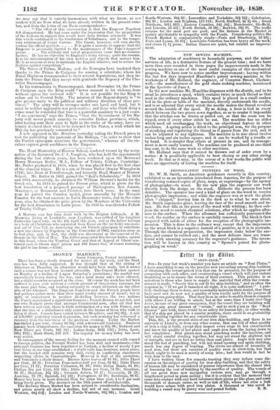trittr fa fig Rita.
" sare-ntow."
Sm—In your last week's number you have an article on "Boat Plates." I have something to say on the practice now prevailing among ship-builders of obtaining the lowest-priced iron that can be procured, for the purpose of competing with each other, and constructing a vessel which will just endure launching so as to insure the terms of their contract. This practice is BO notorious to those who have to supply the material that often the remon- strance is made, "Surely this is not fit for ship-building," and as often the response is, "If we get it launched all right, it is quite sufficient." I pub- licly challenge them to deny, and reasonably maintain their denial, that they have used and do now use a quality of iron totally unfit for the purpose of building sea-going ships. That they dose in order to enable them to compete with others I am willing to admit, but at the same time I insist that they know, in case of any great emergency, that the vessel they are building will not bear any great amount of "strain," and in such a sea as the " Royl Charter" wet with, there would be no safety for human life ; in other words, that if a ship got placed in a similar position, there could be no probability of her holding together for any considerable time.
This, Sir, is the present state of our iron ship-building, and there is no surveyor at Lloyd's, or from any other source, that can tell of what quality of iron a ship is built, except they inspect every stage in her construction and know the quality of her plates and angle iron from the laying down to her completion. Boat plates may stand punching under the machine, and will stand careful riveting together, but may not stand the slightest teat of strength, and are in fact no better than cast plates. Angle iron may also stand the test of punching, but will not stand opening and again shutting, much less any degree of bending. The rivets are almost of necessity of good iron, but there are varieties of quality even in rivet-iron, but that which ought to be used is mostly of scrap iron ; bad iron would in fact be very dear to the user. I have written these few remarks trusting they may induce some dis- cussion on the subject of quality for iron ship-building, and that the safety of human life may be considered of greater importance than the absurd idea of lessening the cost of building by the sacrifice of quality. The vessels of all our great firms now navigating various seas, may go through lengthened period in plain sailing ; but it is evident that the moment they come into contact with any hard substance their plates go like glees, and some thousands of damage ensue, as well as risk of life, where not even a leak would have arisen with good iron plates. A thousand or two saved in building a vessel may be penny wise and pound foolish: B. B.


























 Previous page
Previous page